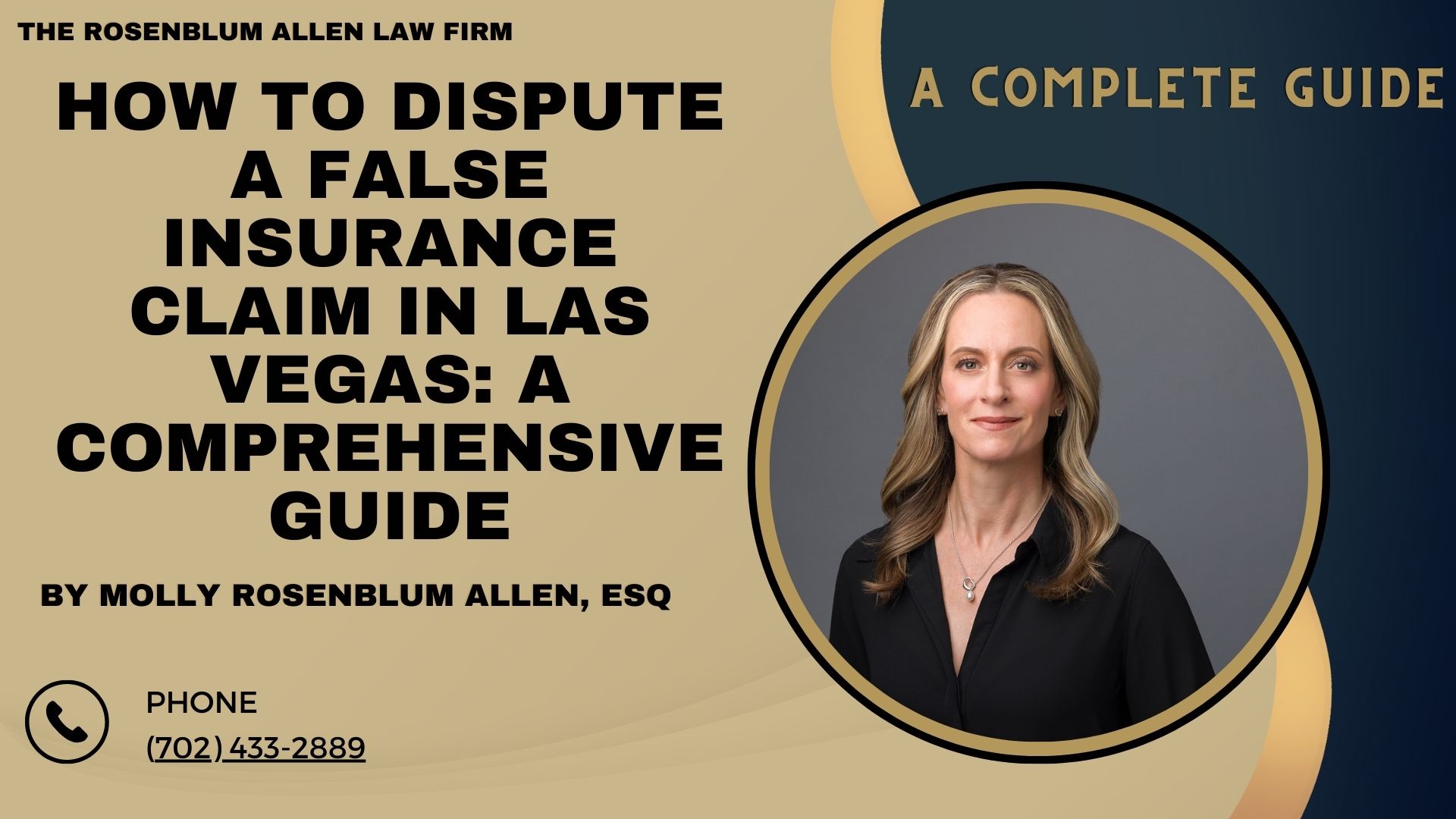This complete guide will walk you through disputing a false insurance claim. It’s in Las Vegas. Facing a false claim can be overwhelming. But, knowing the steps can empower you. You can use them to protect your rights and navigate well.

Understanding False Insurance Claims
False insurance claims come in various forms, including fraud, exaggeration, and misrepresentation. By learning these claim types, you can better spot a false accusation.
Initial Steps When Facing a False Insurance Claim
When faced with a false insurance claim, staying calm is key. You must gather relevant info quickly. Reviewing your insurance policy and notifying your insurance provider are crucial initial steps.
Stay Calm and Gather Information
Maintaining composure is critical when faced with a false insurance claim. Collecting evidence can help your defense. This evidence includes photos, witness statements, and medical records.
Review Your Insurance Policy
Knowing your insurance policy’s terms and coverage will help you. It will help you see if the claim against you is valid.
Notify Your Insurance Provider
Quickly tell your insurer about the false claim. This lets them start their investigation and provide help.

Documenting Evidence to Support Your Case
Documenting evidence is essential to substantiate your defense against a false insurance claim. By gathering various forms of evidence, you can build a compelling case in your favor.
Importance of Documentation
Clear documentation is vital. It helps in disputing false insurance claims by providing evidence for your position.
Types of Evidence to Gather
Diverse evidence can support it. This includes photos, videos, witness statements, and reports. This can help your defense and refute false allegations.

Consulting with a Legal Guide
When facing a false insurance claim, seeking guidance from a lawyer is crucial. Here’s why it’s important:
Benefits of Seeking Legal Counsel
Expertise and Guidance: A lawyer can help you navigate the complexities of insurance law and understand your rights and options.
Protection of Rights: Your attorney ensures your rights are protected throughout the dispute process, preventing potential exploitation.
Strategic Approach: With their experience, your lawyer can develop a strategic plan to dispute the false claim and safeguard your interests effectively.
Choosing the Right Attorney in Las Vegas
Selecting the right attorney is critical to achieving a favorable outcome. Consider these factors:
Experience: Look for an attorney with a proven track record in handling insurance disputes, preferably with experience in Las Vegas courts.
Specialization in Insurance Law: An attorney knowledgeable about insurance law can provide valuable insights and maximize your chances of success.
Communication Skills: Choose a lawyer who can explain legal terms clearly and inform you about your case’s progress.
Client Feedback: Reading reviews and seeking recommendations from past clients can help you gauge the attorney’s credibility and effectiveness.
Personal Compatibility: It’s essential to feel comfortable working with your attorney, as you’ll need to openly discuss sensitive matters related to your case.
Considering these factors, you can find a lawyer who will diligently represent your interests and navigate the legal complexities of disputing a false insurance claim.
Initiating the Dispute Process
Once you’ve secured legal representation, the dispute process will be initiated. Your attorney will guide you through this process, which typically involves:
Contacting Your Insurance Provider: Inform your insurance company about the false claim and provide any relevant documentation.
Filing a Formal Dispute: Submit a formal dispute with your insurance company, outlining why you believe the claim is false.
Providing Evidence to Support Your Claim: Gather evidence, such as photographs, witness statements, and medical records, to support your case.

Navigating the Legal Process
Once you’ve gathered evidence, it’s time to navigate the legal proceedings. Here’s what to expect:
Responding to Requests from Your Insurance Company
Prompt Responses: Cooperate with your insurance company and promptly reply to any information or documentation requests.
Transparency: Be open and honest to avoid complicating the process.
Attending Mediation or Negotiation Sessions
Exploring Settlement Options: Mediation or negotiation sessions may be offered to resolve the dispute outside of court.
Presenting Your Case: Use these sessions to present your evidence and argue your position.
Filing a Lawsuit if Necessary
Considering Legal Action: If mediation fails, you may need to file a lawsuit to resolve the dispute in court.
Following Legal Procedures: Adhere to legal procedures and deadlines to ensure your case proceeds smoothly.

Preparing for Legal Proceedings
As you prepare for legal proceedings, take these essential steps:
Organizing Your Evidence
Reviewing Your Evidence: Double-check that all evidence is organized and easily accessible for court presentation.
Consulting with Your Attorney: Discuss strategies to ensure effective case presentation.
Understanding Court Procedures in Las Vegas
Knowing What to Expect: Familiarize yourself with court procedures in Las Vegas to feel more confident.
Respecting Court Etiquette: Follow all rules and regulations during proceedings to maintain decorum.

Presenting Your Case
When presenting your case in court, clarity and organization are essential. Here’s how to effectively present your arguments:
Building a Strong Argument
Introduction: Start by introducing your case and outlining the main points you’ll address.
Facts and Evidence: Present the facts and provide evidence to support your claims. Use visual aids like photos or diagrams if helpful.
Witness Testimony: If you have witnesses, call them to testify and support your version of events.
Legal Arguments: Present arguments supporting your position, citing relevant laws and precedents.
Communicating Clearly
Simple Language: Avoid legal jargon and complex terms. Explain concepts in plain, easy-to-understand language.
Engage the Judge or Jury: Speak clearly and confidently to engage the judge or jury.
Visual Aids: Use charts or graphs to illustrate key points and make your argument more compelling.

Addressing Counterarguments
Anticipating and addressing counterarguments is crucial. Here’s how to handle opposing claims effectively:
Anticipating Counterarguments
Identify Potential Challenges: Consider possible counterarguments the opposing party may raise.
Gathering Rebuttal Evidence: Collect additional evidence or witness testimony to refute potential counterarguments.
Responding Effectively
Stay Calm and Focused: Remain composed when addressing counterarguments to maintain credibility.
Presenting Counter Evidence: Present evidence that contradicts the opposing party’s claims.

Reaching a Resolution
The goal is to resolve. Here’s what to expect during this stage:
Settlement Negotiations
Exploring Settlement Options: Both parties may negotiate to reach a settlement agreement.
Finding Common Ground: Identify areas of compromise for a mutually acceptable resolution.
Court Decision
Judgment: The judge or jury will evaluate the evidence and decide.
Accepting the Outcome: Respect the court’s decision, whether in your favor.

Finalizing the Outcome
After presenting your case, it’s crucial to conclude the process effectively. Here’s how to finalize the outcome:
Reviewing the Judgment
Understanding the Decision: Take the time to understand the court’s decision thoroughly.
Assessing Next Steps: Discuss the judgment with your attorney to decide if further action, such as an appeal, is needed.
Compliance with Legal Obligations
Ensuring compliance with legal obligations is vital for wrapping up the case smoothly:
Adhering to Court Orders: Follow any court orders or directives specified in the judgment to avoid penalties or complications.
Meeting Deadlines: Be diligent about meeting deadlines to fulfill any obligations the court imposes to ensure timely compliance.

Breaking It All Down
In legal disputes, the legal system is complex. Navigating it can be daunting. Yet, with the right knowledge and guidance, you can manage the process well. You can work towards a good outcome.

Frequently Asked Questions
How do I dispute a false insurance claim in Las Vegas?
Disputing a false insurance claim involves gathering evidence. You also need to consult a lawyer and present your case well. This guide provides detailed instructions on navigating the process.
What if I receive a false insurance claim against me?
Respond quickly. Gather evidence. Get legal advice to refute false allegations against you.
How can I find a reliable attorney?
Research reputable law firms. Read reviews. Schedule consultations to discuss your case.
What are the consequences of not disputing a false claim?
Financial losses, damage to reputation, and legal penalties are potential consequences.
How long does disputing a claim typically take?
Timelines vary based on case complexity. Consult a legal professional for insights.
Can I handle the process alone?
While possible, legal representation increases chances of success.
What evidence should I gather?
Documents, photos, witness statements, and expert opinions can strengthen your defense.
What if I disagree with the court’s judgment?
Explore appeal options with your attorney.
How do I ensure compliance with legal obligations?
Review court orders and meet deadlines as directed.
How can I achieve closure post-resolution?
Reflect on outcomes, seek support if needed, and set new goals.
How do I prevent future disputes?
Learn from past experience. Use risk mitigation. Seek ongoing legal advice.

Glossary
Dispute: To challenge or contest a claim, typically through legal means.
Insurance Claim: A formal request for compensation from an insurance company based on the terms of a policy.
Evidence: Information or materials used to support an argument or claim.
Legal Expert: A professional knowledgeable in legal matters, such as an attorney or lawyer.
Consultation: A meeting with a lawyer to seek advice or guidance.
Attorney: A legal professional authorized to represent clients in legal matters.
Judgment: The final decision made by a court regarding a legal dispute.
Compliance: Adherence to legal requirements or directives.
Appeal: The process of requesting a higher court to review a lower court’s decision.
Closure: The sense of resolution after a legal dispute.
Risk Mitigation: Identifying and reducing potential risks or liabilities.
Legal Guidance: Advice provided by legal professionals.

Additional Resources for You
Ensure to check out the additional resources crafted by our lead attorney, Molly Rosenblum Allen, Esq., to support you during challenging times:
- Las Vegas Personal Injury Attorney: Get comprehensive legal aid for personal injury cases.
- Las Vegas Car Accident Attorney: Specialized legal assistance for car accident cases.
- Motorcycle Accident Lawyer Las Vegas: Dedicated support for motorcycle accident victims.
- Wrongful Death Lawyer Las Vegas: Compassionate aid for wrongful death cases.
- Truck Accident Attorney Las Vegas: Expert representation for truck accident cases.
- Las Vegas Drunk Driving Accident Attorney: Legal support for drunk driving accident cases.
- Las Vegas Slip and Fall Attorney: Assistance for individuals involved in slip and fall accidents.
These resources are designed to provide you with valuable support and guidance. Feel free to explore them for further assistance.

Outside Resources for You
Here are some helpful resources related to the content:
- American Bar Association (ABA): Provides legal information and support across various legal matters.
- NOLO: Offers legal guides and resources, including DIY legal information.
- FindLaw: Provides legal information and lawyer directories to help find legal representation.
- LegalZoom: Offers legal services and resources for personal injury claims and other legal matters.
- Avvo: Provides legal advice and lawyer ratings to connect individuals with experienced attorneys.
- Martindale-Hubbell: Offers a lawyer directory and legal resources to find qualified attorneys.
- HG.org: Provides access to legal articles, guides, and professionals specializing in various practice areas.
These resources can provide valuable assistance and information when navigating legal issues.

A Special Message from Our Lead Attorney, Molly Rosenblum Allen, Esq

I want to extend my heartfelt thanks for exploring the legal resources we’ve provided. You dedicate yourself to understanding your legal rights and options. I admire that, and I’m grateful for the chance to join your journey.
Please feel free to reach out if you have any further questions or concerns about your legal matters. I’m here to help. You can schedule a free consultation by calling our office at (702) 433-2889. During this consultation, we can detail your case and determine the best path forward.


